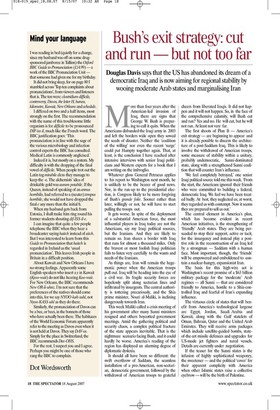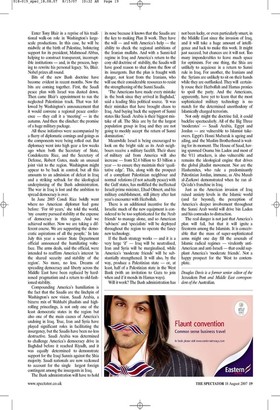Bush's exit strategy: cut and run but not too far
Douglas Davis says that the US has abandoned its dream of a democratic Iraq and is now aiming for regional stability by wooing moderate Arab states and marginalising Iran More than four years after the American-led invasion of Iraq, there are signs that George W Bush is preparing to call it quits. When the Americans disbanded the Iraqi army in 2003 and left the borders wide open they sowed the seeds of disaster. Neither the 'coalition of the willing' nor even the recent 'surge' could put Humpty together again. That, at least, is the conclusion I have reached after intensive interviews with senior Iraqi politicians and Western experts for a book that I am writing on the imbroglio.
Whatever gloss General Petraeus applies to his report to Washington next month, he is unlikely to be the bearer of good news. Nor, in the run-up to the presidential election, is Congress likely to be more forgiving of Bush's grande folie. Sooner rather than later, willingly or not, he will have to start pulling the troops out.
It gets worse. In spite of the deployment of a substantial American force, the most influential players in Iraq today are not the Americans, say my Iraqi political sources, but the Iranians. And they are likely to remain so. Iran shares a border with Iraq that runs for almost a thousand miles. Only the bravest or most foolish Iraqi politician fails to listen very carefully to the wants and needs of the Iranians.
As things are, Iran will remain the hegemonic power when the American troops pull out. Iraq will be heading into the eye of a civil war. Its fragile security forces are hopelessly split along sectarian lines and infiltrated by insurgents. The central authority is tottering precariously, and the Shia prime minister, Noun i al-Maliki, is inclining dangerously towards Iran.
This week Maliki called a crisis meeting of his government after many Sunni ministers resigned and others boycotted government meetings. Amid the gathering political and security chaos, a complex political fracture of the state appears inevitable. That is the nightmare scenario facing Bush, and it could hardly be worse. America's reading of the region has displayed an alarming degree of diplomatic dyslexia.
It should all have been so different: the swift overthrow of Saddam, the seamless installation of a pro-American, non-sectarian, democratic government, followed by the withdrawal of American troops to grateful cheers from liberated Iraqis. It did not happen and it will not happen. So, in the face of the comprehensive calamity, will Bush cut and run? Yes and no. He will cut, but he will not run. At least not very far.
The first shoots of Plan B — America's exit strategy — are beginning to appear and it is already possible to discern the architecture of a post-Saddam Iraq. This is likely to involve the withdrawal of American troops, some measure of stability within a unitary, probably undemocratic, Sunni-dominated state, along with a strengthened Sunni coalition that will counter Iran's influence.
'We feel completely betrayed,' one senior Iraqi political source told me this week. 'From the start, the Americans ignored their friends who were committed to building a federal, democratic Iraq. We feel we have been treated badly. At best, they neglected us; at worst, they regarded us with contempt. Now it seems they are prepared to sell us out.'
The central element in America's plan, which has become evident in recent American initiatives, is the strengthening of 'friendly' Arab states. They are being persuaded to stop their support, active or tacit, for the insurgency and instead play a positive role in the reconstruction of an Iraq led by a strongman — Saddam with a human face. Most important, though, the `friends' will be empowered and emboldened to contain a nuclear-hungry, expansionist Iran.
The basis for this high-wire act is Washington's recent promise of a $63 billion military package for the 'moderate' Arab regimes — all Sunni — that are considered friendly to America, hostile to a Shia-controlled Iraq and fearful of Iran's expanding influence.
The virtuous circle of states that will benefit from America's technological largesse are Egypt, Jordan, Saudi Arabia and Kuwait, along with the Gulf statelets of Oman, Bahrain, Qatar and the United Arab Emirates. They will receive arms packages which include satellite-guided bombs, stateof-the-art missile defences and upgrades for US-made jet fighters and naval vessels. Details are currently under negotiation.
If the teaser for the Sunni states is the infusion of highly sophisticated weaponry, the sweetener — and the political 'cover' for their apparent complicity with America when other Islamic states raise a collective eyebrow — will be the birth of Palestine.
Enter Tony Blair in a reprise of his traditional walk-on role in Washington's largescale productions. In this case, he will be midwife at the birth of Palestine, bolstering support for its president, Mahmoud Abbas, helping to construct transparent, incorruptible institutions — and, in the process, hoping to rewrite his personal legacy. Yo, Blair. Nobel prizes all round.
Bits of the new Bush doctrine have become evident in recent months. Now the bits are coming together. First, the Saudi peace plan with Israel was dusted down. Then came Blair's appointment to run the neglected Palestinian track. That was followed by Washington's announcement that it would convene a regional peace conference — they call it a 'meeting' — in the autumn. And then the clincher: the promise of a huge military package.
All these initiatives were accompanied by a flurry of diplomatic comings and goings as the components were being rolled out. But diplomacy went into high gear a few weeks ago when both the Secretary of State, Condoleezza Rice, and the Secretary of Defense, Robert Gates, made an unusual joint visit to the region. Washington might appear to be back in control, but all this amounts to an admission of defeat in Iraq and a striking setback for the ideological underpinning of the Bush administration. The war in Iraq is lost and the ambition to spread democracy is over.
In June 2005 Condi Rice boldly went where no American diplomat had gone before: 'For 60 years,' she told the world, 'my country pursued stability at the expense of democracy in this region. And we achieved neither. Now we are taking a different course. We are supporting the democratic aspirations of all the people.' In late July this year a senior State Department official announced the humiliating volteface. The arms deals, said the official, were intended to reaffirm America's interest 'in the shared security and stability of the region'. No more, no less. Dreams of spreading democracy and liberty across the Middle East have been replaced by hardnosed pragmatism and a return to old-fashioned stability.
Compounding America's humiliation is the fact that the Saudis are the linchpin of Washington's new vision. Saudi Arabia, a bizarre mix of Wahhabi jihadists and highrolling princelings, is not only one of the least democratic states in the region but also one of the main causes of America's undoing in Iraq. True, Iran and Syria have played significant roles in facilitating the insurgency, but the Saudis have been no less destructive. Saudi Arabia was determined to challenge America's democracy drive in Baghdad before it reached Riyadh, and it was equally determined to demonstrate support for the Iraqi Sunnis against the Shia majority. Saudi nationals are now reckoned to account for the single largest foreign contingent among the insurgents in Iraq.
The Bush administration will have to hold its nose because it knows that the Saudis are the key to making Plan B work. They have the will — and with America's help — the ability to check the regional ambitions of the Iranian mullahs. And with a Sunni-led regime in Iraq and America's return to the cosy old doctrine of stability, the Saudis will have good reason to shut down the flow of its insurgents. But the plan is fraught with danger, not least from the Iranians, who will use their considerable resources to resist the strengthening of the Sunni Saudis.
'The Americans have made every mistake in the book since they arrived in Baghdad,' said a leading Shia political source. 'It was their mistakes that have brought chaos to Iraq. And buying back the support of Sunni states like Saudi Arabia is their biggest mistake of all. The Shia are by far the largest population group in Iraq and they are not going to meekly accept the return of Sunni domination.'
Meanwhile Israel is being encouraged to look on the bright side as its Arab neighbours receive a military facelift. Their share of military aid from America will also increase — from $2.4 billion to $3 billion a year — to ensure they maintain their 'qualitative edge'. This, along with the prospect of a compliant Palestinian neighbour and normal relations (if not actually peace) with the Gulf states, has mollified the ineffectual Israeli prime minister, Ehud Olmert, and his military establishment, still jittery after last year's encounter with Hezbollah.
There is an additional incentive for the Israelis: much of the new equipment is considered to be too sophisticated for the 'Arab friends' to manage alone, and so American 'advisers' and 'specialists' will be deployed throughout the region to operate the fancy new technology.
If the Bush strategy works — and it is a very large 'if' — Iraq will be neutralised, Iran and Syria will be marginalised, while America's 'moderate friends' will be substantially strengthened. It will also, by the way, produce a Palestinian state — or, at least, half of a Palestinian state in the West Bank (with an invitation to Gaza to join when and if it mends its Hamas ways).
Will it work? The Bush administration has not been lucky, or even particularly smart, in the Middle East since the invasion of Iraq, and it will take a huge amount of intelligence and luck to make this work. It might just succeed, but chances are it will not. Too many imponderables to leave much space for optimism. For one thing, the Shia are unlikely to acquiesce in a return to Sunni rule in Iraq. For another, the Iranians and the Syrians are unlikely to sit on their hands while they are outflanked. They will certainly rouse their Hezbollah and Hamas proxies to spoil the party. And the Americans, apparently, have yet to learn that the most sophisticated military technology is no match for the determined unorthodoxy of Islamically charged terrorists.
Not only might the doctrine fail, it could backfire spectacularly. All of the Big Three 'moderates' — Saudi Arabia, Egypt and Jordan — are vulnerable to Islamist takeovers. Egypt's Hosni Mubarak is ageing and ailing, and the Muslim Brotherhood is waiting for its moment. The House of Saud, having spawned Osama bin Laden and most of the 9/11 attackers, is also vulnerable and remains the ideological engine that drives the global jihadist movement. Nor are the Hashemites, who rule a predominantly Palestinian Jordan, immune, as Abu Musab al-Zarkawi demonstrated when he ran alQa'eda's franchise in Iraq.
Just as the American invasion of Iraq raised anxiety levels in the Islamic world (and far beyond), the perception of America's deeper involvement throughout the Sunni Arab world will drive bin Laden and his comrades to distraction.
The real danger is not just that America's plan will fail, but that it will ignite a firestorm among the Islamists. It is conceivable that the mass of super-sophisticated arms might one day fill the arsenals of Islamic radical regimes — virulently antiAmerican and anti-Israeli — that could supplant America's 'moderate friends'. Not a happy prospect for the West to contemplate.
Douglas Davis is a former senior editor of the Jerusalem Post and Middle East correspondent of the Australian.













































 Previous page
Previous page